Select Language
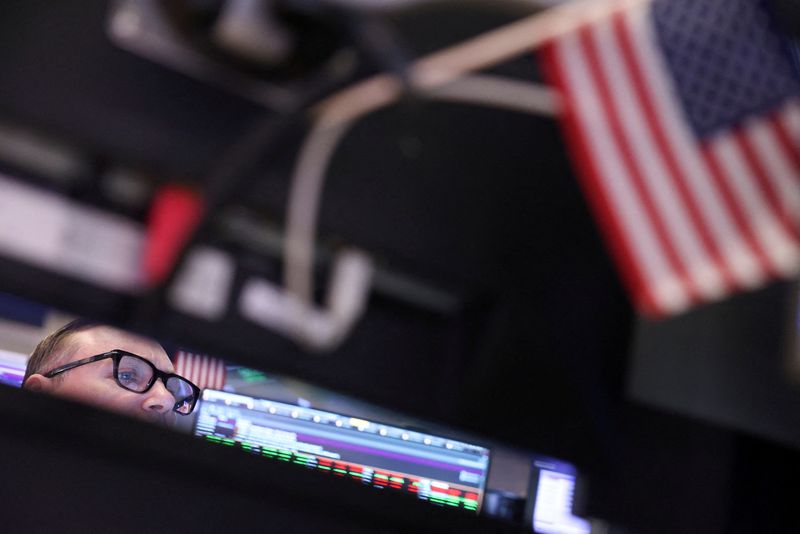
(Reuters) -U.S. household wealth eked out a fresh record high at the end of 2024, Federal Reserve data showed on Thursday, thanks to a stock market rally that appears to have run out of steam in the past three weeks.
The net worth of households and non-profit groups rose about $200 billion to $169.4 trillion in the fourth quarter of last year, the U.S. central bank said in its quarterly U.S. financial accounts report, as a drop in the value of real estate trimmed gains from equities.
Stock market holdings, the biggest component of household net worth, rose about $300 billion to $56 trillion in value, while household real estate, the second-biggest component, fell about $400 billion to $48.1 trillion.
The S&P 1500 Composite index, which encompasses the vast majority of the U.S. stock market, gained 2.1% in the fourth quarter of 2024. It has lost nearly $4 trillion in value since President Donald Trump’s January 20 inauguration and about $2.7 trillion since this year began.
The report offers a snapshot of the broad financial health of U.S. families, businesses and the public sector at the end of former President Joe Biden’s administration. During the final full quarter of 2025, household debt grew at a 3.1% annual pace, in line with previous quarters, while non-financial sector business debt rose just 1%, the slowest pace in a year.
Federal government debt, which Trump hopes to reduce in part by slashing government payrolls and spending, expanded at a pace of 8.4%, while state and local government debt shrank 1.4%.
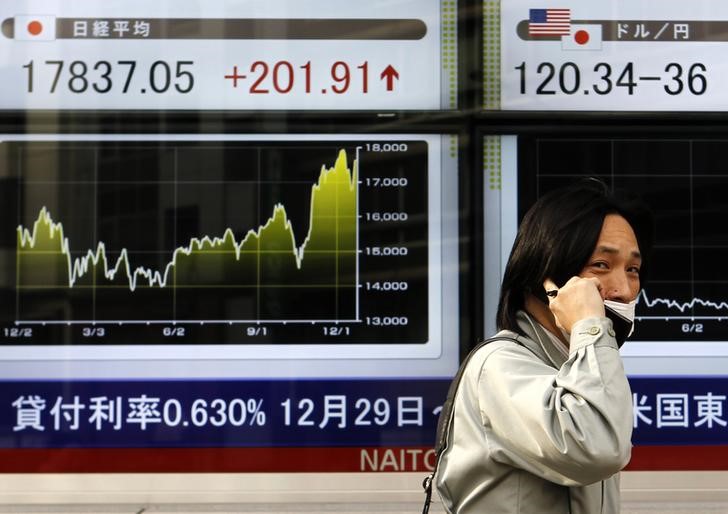
Investing.com-- Most Asian stocks rose on Thursday with shares in Japan and South Korea tracking an overnight rebound in U.S. tech stocks, but gains were limited amid fresh tariff threats from U.S. President Donald Trump.
Major U.S. stock indexes closed higher on Wednesday, while their futures edged higher in Asian trading as a cooler-than-expected inflation reading provided respite.
Asia tech stocks rise as Nasdaq jumps after soft CPI
In the U.S., the NASDAQ Composite jumped 1.2% overnight following softer-than-expected February Consumer Price Index (CPI) data.
The CPI indicated a cooling of inflation, with both the overall CPI and core CPI rising only 0.2% month-on-month, below expectations.
The positive sentiment in Asia was largely driven by gains in technology stocks, which benefited from the U.S. market’s performance.
Investors were encouraged by the cooling inflation data, which could influence the Federal Reserve’s monetary policy decisions.
Japan’s Nikkei 225 advanced 1%, while TOPIX gained 0.9%.
SoftBank Group (TYO:9984) shares rose 1.4%, while Tokyo Electron (TYO:8035) stock jumped 1.8%.
South Korea’s KOSPI rose 0.5% with tech heavyweights Samsung Electronics (KS:005930), and SK Hynix Inc (KS:000660) gaining 0.7%, and 0.4%, respectively.
Malaysia’s FTSE Malaysia KLCI index jumped 1.2%, while India’s Nifty 50 Futures edged 0.2% higher.
However, analysts caution that despite the upbeat market movements, underlying concerns such as trade tensions and global economic uncertainties persist, suggesting that market volatility may continue in the near term.
Trump threatens more tariffs on EU, escalates trade tensions
On Wednesday, President Trump threatened additional tariffs on European Union (EU) goods if the EU proceeded with its planned counter-tariffs on U.S. products.
This escalation came shortly after the U.S. implemented a 25% tariff on steel and aluminum imports, a move that has strained relations with key trading partners.
The intensifying trade tensions between major Western economies have raised concerns about potential ripple effects on Asian markets.
Given Asia’s deep integration into global trade networks, any slowdown in Western economies could dampen demand for Asian exports, thereby affecting the region’s growth trajectory.
China’s Shanghai Composite fell 0.4% on Thursday, while the Shanghai Shenzhen CSI 300 index inched 0.2% lower.
Hong Kong’s Hang Seng index ticked down 0.3%.
Australia’s S&P/ASX 200 index was trading 0.1% lower at 7,782.0, on the brink of entering a market correction territory.
The index has fallen 9.7% from its record high of 8,615.20 points reached on Feb. 14.
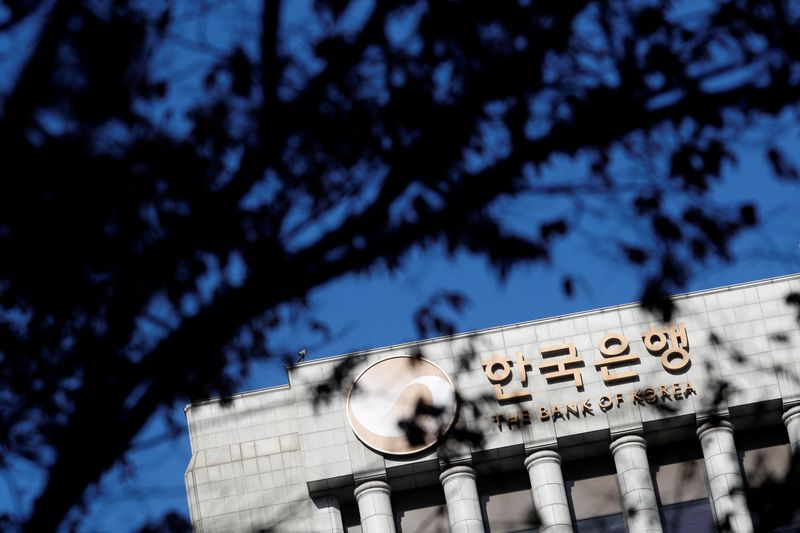
SEOUL (Reuters) - South Korea’s central bank said on Thursday that U.S. President Donald Trump’s escalating trade war could drag on longer than expected and increase the risk of capital outflows while also raising volatility in the dollar-won market.
"Considering that the value of the won is greatly affected by fluctuations in the value of the yuan as well as the dollar, there is a possibility that the volatility of the dollar-won exchange rate will increase significantly," the Bank of Korea (BOK) said in a monetary policy report, which predicted that a trade war between the world’s two largest economies could intensify.
The report said the BOK will continue to "closely monitor foreign investment and the currency movement" as it remains wary of foreign investors pulling money out of Asia’s fourth-largest economy.
The won has gained 1.6% against the dollar so far this year, but dropped 14% last year, making it one of the worst-performing currencies in Asia.
The BOK on Feb. 25 cut interest rates by 25 basis points and significantly lowered its GDP forecasts, the third monetary easing since it started cutting rates from a 15-year high in October.
South Korea is grappling with the economic impact of U.S. President Donald Trump’s ongoing tariff war, which is likely to undermine corporate profits.
Domestic political unrest, following the brief declaration of martial law by impeached President Yoon Suk Yeol in December, also continues to dampen consumer sentiment.
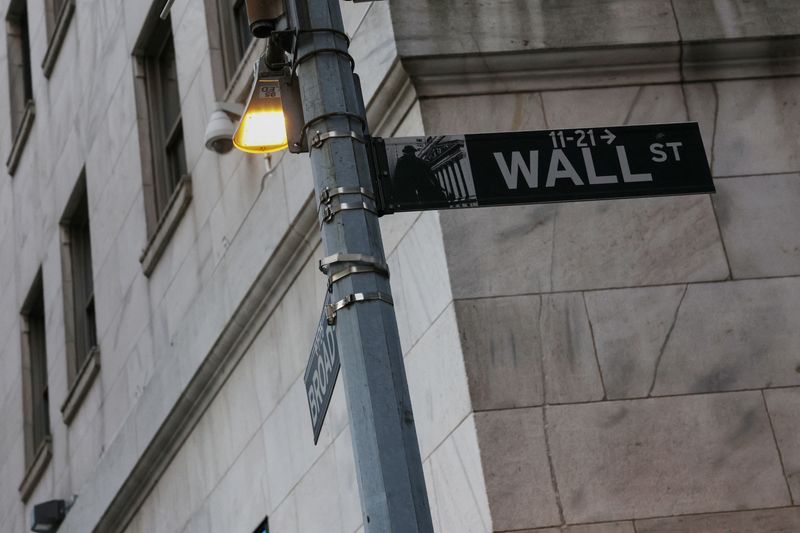
By Stephen Culp
NEW YORK (Reuters) -U.S. stocks advanced on Wednesday as cooler-than-expected inflation data helped stanch a sharp selloff, while the escalation of U.S. President Donald Trump’s chaotic, multi-front tariff war kept gains in check.
The S&P 500 and the Nasdaq closed in positive territory, the latter enjoying a muscular boost from tech and tech-adjacent momentum stocks.
The blue-chip Dow waffled between red and green for much of the session but ended modestly lower on the day.
The Labor Department’s Consumer Price Index showed consumer prices cooling more than analysts expected, providing reassurance that inflation is headed in the right direction and keeping hopes alive that the U.S. Federal Reserve could cut its key interest rate this year.
"We’re seeing a bounce today on the lower-than-expected inflation read and some dip buying," said Greg Bassuk, CEO of AXS Investments in New York. "But Wall Street and Main Street are still looking for direction."
"Investors’ hopefulness about inflation cooling is being mitigated by the ongoing trade-war strife," Bassuk added. "And for that reason, we really expect the uncertainty and volatility to continue here through much of March."
In his latest tariff salvo, Trump imposed 25% duties on imported steel and aluminum, prompting Canada and Europe to respond in kind, ramping up their retaliatory tariffs on U.S. exports.
U.S. equities have come under pressure amid the rising temperature of tit-for-tat tariff disputes between the United States and its trading partners, rattling investors and giving rise to fears that the resulting price jolts could tip the United States, along with Canada and Mexico, into recession.
Goldman Sachs lowered its year-end target for the S&P 500, while J.P. Morgan sees increasing odds of a U.S. recession.
With Wednesday’s advance, the S&P 500 is 8.9% below its all-time closing high reached less than a month ago. On Monday, the bellwether index dipped below its 200-day moving average, considered a significant support level, for the first time since November 2023.
On March 6, the tech-heavy Nasdaq dipped more than 10% below its record closing high reached on December 16, confirming it has been in a correction since then.
The Dow Jones Industrial Average fell 82.55 points, or 0.20%, to 41,350.93, the S&P 500 gained 27.23 points, or 0.49%, to 5,599.30 and the Nasdaq Composite gained 212.36 points, or 1.22%, to 17,648.45.
Technology shares led the gainers among the 11 major sectors in the S&P 500, while consumer staples and healthcare were the laggards.
Intel (NASDAQ:INTC) jumped 4.6% after a report said TSMC had pitched Nvidia (NASDAQ:NVDA), Advanced Micro Devices (NASDAQ:AMD) and Broadcom (NASDAQ:AVGO) about taking a stake in a joint venture to operate the U.S. chip company’s factories.
PepsiCo (NASDAQ:PEP) fell 2.7% after brokerage Jefferies downgraded its rating on the stock to "hold" from "buy."
Lawmakers on Capitol Hill continued to wrangle over a stopgap spending bill in an effort to avoid a government shutdown, adding further uncertainties to the mix.
Advancing issues outnumbered decliners by a 1.15-to-1 ratio on the NYSE. There were 29 new highs and 186 new lows on the NYSE.
On the Nasdaq, 2,589 stocks rose and 1,785 fell as advancing issues outnumbered decliners by a 1.45-to-1 ratio.
The S&P 500 posted no new 52-week highs and 18 new lows while the Nasdaq Composite recorded 26 new highs and 200 new lows.
Volume on U.S. exchanges was 16.14 billion shares, compared with the 16.59 billion average for the full session over the last 20 trading days.
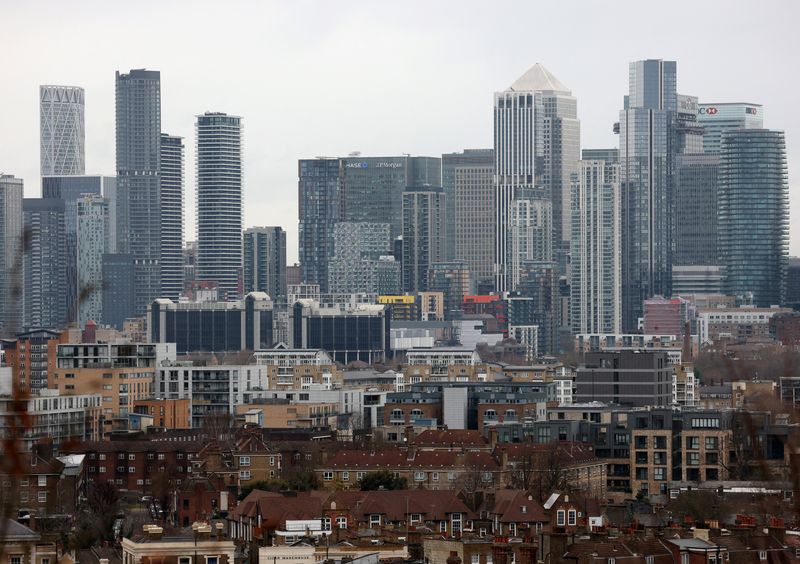
LONDON (Reuters) - Britain’s housing market had its slowest month in more than a year in February as a rush by buyers to close deals ahead of the expiry of a tax break ran out of steam, a survey published on Thursday showed.
The Royal Institution of Chartered Surveyors said buyer demand was the weakest since November 2023 and a further softening was expected in the months ahead.
The report’s net balance of house prices - which measures the difference between surveyors reporting a rise and a fall -dropped to +11 - its lowest since September last year - down from +21 in January and a two-year high of +25 in December.
The figure was below all forecasts in a Reuters poll of economists which had pointed to only a slight slowdown.
Britain’s housing market gathered speed in recent months, helped by expectations of Bank of England interest rate cuts and by buyers seeking to beat a March 31 expiry of tax breaks for purchases of less expensive homes and for first-time buyers.
But that flurry of activity appears to have cooled now with time almost running out to beat the deadline.
RICS Chief Economist Simon Rubinsohn linked the slowdown to the expiry and to worries about inflation pressures caused by global uncertainty, which has spiked since Donald Trump took over as U.S. president.
"That said, looking beyond the next few months, sales activity is seen as likely to resume an upward trend with prices also moving higher," Rubinsohn said.
In the property rentals market, tenant demand contracted for a fourth month in a row, the longest such stretch since collection of the figures began in 2012.
But a net balance of +34% of survey participants expected rents to rise in the coming three months as the flow of properties coming on to the market dries up more quickly than demand.
Prime Minister Keir Starmer has promised to speed up house-building to help tackle the shortage of homes in Britain.

By Amy Lv and Lewis Jackson
BEIJING (Reuters) - Iron ore futures surrendered early gains to trade lower on Wednesday, as sentiment was spooked by resumed market talks of China’s plan of trimming crude steel output to rein in oversupply plaguing the industry.
The most-traded May iron ore contract on China’s Dalian Commodity Exchange (DCE) ended daytime trade 0.32% lower at 769.5 yuan ($106) a metric ton after touching an intraday high of 785 yuan a ton earlier in the session.
The benchmark April iron ore on the Singapore Exchange (OTC:SPXCY) slipped 0.8% to $99.95 a ton, as of 0744 GMT after touching the highest since March 3 at $102.05 a ton earlier.
The weakness came after market speculation that details for China’s steel output control have been finalized and will be made public later this week.
China’s National Development and Reform Commission, its state planner, did not respond to Reuters’ request for comment.
The state planner unveiled its plan on March 5 to curtail crude steel output this year, without specifying details on the volumes to be cut and from when.
Some market participants had speculated that steel output could be cut by 50 million tons this year.
A reduction in steel output will lower consumption of steelmaking feedstocks.
Ore prices rose in morning trading as investors bet on a pick-up in near-term demand for the key steelmaking ingredient after the conclusion of China’s annual parliament meeting.
Some steel mills, which had started maintenance on their blast furnaces, gradually resumed operations driven by decent margins and signs of improving demand, analysts at consultancy Mysteel said in a note.
Steel benchmarks on the Shanghai Futures Exchange gained ground. Rebar added 0.59%, hot-rolled coil rose 0.63%, wire rod climbed 0.29% and stainless steel ticked 0.71% higher.
Other steelmaking ingredients on the DCE advanced, with coking coal and coke up 0.8% and 0.06%, respectively.
($1 = 7.2461 Chinese yuan)

Investing.com-- Oil prices rose in Asian trade on Wednesday, recovering mildly after increased concerns over U.S. trade tariffs and slowing economic growth dragged prices to over three-year lows.
Focus was now squarely on a monthly report from the Organization of Petroleum Exporting Countries (OPEC) for more cues on supply, especially after the cartel agreed to begin increasing production earlier this month.
Oil gained some ground this week after plummeting to more than three-year lows, although sentiment remained largely on edge amid persistent concerns over slowing demand and tariff-related disruptions.
Expectations of some supply disruptions in Russia also aided prices, after Ukraine claimed it had attacked a major oil refinery in Moscow. This came after Kyiv agreed to a tentative ceasefire deal brokered by the U.S., which Moscow is yet to accept.
Brent oil futures expiring in May rose 0.5% to $69.92 a barrel, while West Texas Intermediate crude futures rose 0.6% to $66.30 a barrel by 21:34 ET (01:34 GMT).
Canada threatens oil export curbs over US tariffs
Oil markets tumbled over the last three weeks on concerns over increased tariffs under U.S. President Donald Trump, who had last week imposed 25% tariffs on Canada and Mexico, and a 20% duty on top oil importer China.
While Trump did order temporary relief for Canada and Mexico, the countries, along with China, announced their own retaliatory measures, marking the beginning of a global trade war.
Canadian officials threatened to limit energy exports to the U.S.- a scenario that could spur some tightening in oil supplies. But such measures will be contingent on the U.S. imposing steeper tariffs.
Trump has largely kept up his threats of reciprocal tariffs, which he says will be imposed in early-April.
OPEC report awaited for demand, supply cues
Focus on Wednesday was on the OPEC’s monthly report, which comes just weeks after the cartel acquiesced to Trump’s demands of increasing production, albeit marginally.
The report will be watched for any more insight into the cartel’s plans for production, with several member countries having flagged plans to increase production further in 2025.
The OPEC’s outlook for global demand- which the cartel has steadily cut over the past year- will also be in focus, especially amid signs of more stimulus measures in top oil importer China.
US inventories, CPI data awaited
Traders were also awaiting more cues on the world’s biggest oil consumer, with inventory and consumer price index inflation data due later on Wednesday.
Data from the American Petroleum Institute showed a much bigger-than-expected build in U.S. inventories, heralding a similar trend from official inventory data.
CPI data is expected to show inflation remained largely sticky in February, pointing to few chances of monetary easing in the near-term.
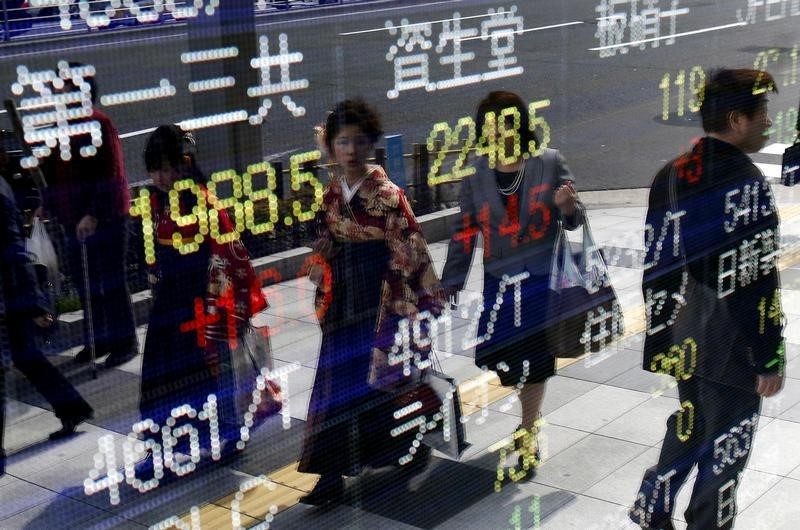
Investing.com-- Asian stocks were mixed on Wednesday with equities in Australia and Malaysia leading losses amid renewed uncertainty over U.S. President Donald Trump’s trade policies, while South Korean shares jumped tracking a modest rebound in U.S. tech giants.
Major U.S. stock indexes extended their biggest sell-off in months on Tuesday, rattled by Trump’s shifting stance on tariffs.
Malaysia, Philippines markets slide amid trade tensions
President Trump on Tuesday announced an increase in tariffs on Canadian steel and aluminum imports to 50%, only to retract the decision hours later, reinstating the original 25% tariffs.
This abrupt policy reversal has contributed to heightened volatility in global financial markets.
The initial announcement of the tariff hike raised concerns about escalating trade tensions between the U.S. and its trading partners, prompting investors to reassess risks associated with international trade.
The subsequent reversal of the decision added to the unpredictability, further unsettling investor confidence.
Most Asian markets, which are highly sensitive to global trade dynamics, reacted negatively to these developments.
As of 02:37 GMT, China’s Shanghai Composite inched 0.2% lower, while the Shanghai Shenzhen CSI 300 index lost 0.3%.
Hong Kong’s Hang Seng index was largely muted.
Malaysia’s KLCI index dropped 1.5%, while the Philippines’ PSEi Composite declined 1.2%.
Aussie stocks briefly enter correction territory as US rules out tariff exemption
Australia’s S&P/ASX 200 index slipped as much as 1.6% on Tuesday, briefly entering a market correction territory.
It was currently trading 1.3% lower at 7,786.30 points.
Australian Prime Minister Anthony Albanese said the country will not impose reciprocal tariffs on the U.S., despite President Trump ruling out exemptions on steel and aluminum tariffs.
This comes after Trump initially suggested considering an exemption for Australia but later confirmed the 25% tariffs would apply to all countries.
S. Korea shares rebound as tech gains
South Korea’s KOSPI jumped 1.6% with tech heavyweights Samsung Electronics (KS:005930), and SK Hynix Inc (KS:000660) advancing 2.1%, and 4.5%, respectively.
U.S. tech giants such as NVIDIA Corporation (NASDAQ:NVDA), Broadcom Inc (NASDAQ:AVGO), and Tesla Inc (NASDAQ:TSLA) saw a slight rebound on Tuesday, after sharp declines on Monday, splashing some gains into the Asian tech sector.
Japan’s Nikkei 225 inched 0.3% higher after plunging to a six-month low in the previous session. TOPIX rose 0.9%.
Futures for Nifty 50 edged up 0.2% on Wednesday.
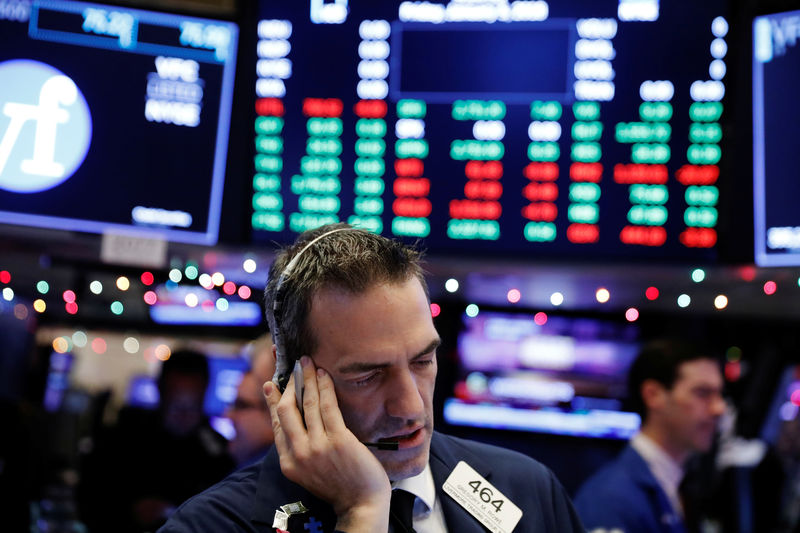
U.S. stock index futures inched higher on Tuesday evening following a continued sell-off on Wall Street, as investors grappled with uncertainty over President Donald Trump’s fluctuating tariff policies.
S&P 500 Futures edged up 0.3% to 5,594.25 points, while Nasdaq 100 Futures rose 0.4% to 19,473.0 points by 19.49 ET (23:49 GMT). Dow Jones Futures edged 0.2% higher to 41,556.0 points.
Tariff flip-flop: Trump scraps 50% hike hours after announcement
President Donald Trump on Tuesday announced an escalation in trade tensions by declaring a 50% tariff on Canadian steel and aluminum imports, up from the existing 25%.
This abrupt decision was in direct response to Ontario’s imposition of a 25% surcharge on electricity exports to the U.S. The heightened tariffs were intended to pressure Canada into revising its trade policies.
However, within hours, a rapid de-escalation occurred. Ontario Premier Doug Ford agreed to suspend the electricity surcharge and scheduled a meeting with U.S. Commerce Secretary Howard Lutnick in Washington.
In response, President Trump rescinded the 50% tariff threat, reverting to the original 25% rate on Canadian metals.
While the immediate threat of escalating tariffs was averted, investors remained cautious, recognizing that such abrupt policy shifts can have swift and significant impacts on market dynamics.
Dow, S&P 500 extend declines; CPI data awaited
In regular trading on Tuesday, the S&P 500 fell 0.8%, while the Dow Jones Industrial Average declined 1.1%. NASDAQ Composite closed 0.2% lower after slumping 4% on Monday.
Tesla Inc (NASDAQ:TSLA) shares saw a slight rebound, rising 3.7% after a 15% drop on Monday.
President Trump showcased support for Elon Musk’s Tesla by checking out a red sedan on the White House driveway, amid backlash over Musk’s ties to his administration and government downsizing efforts.
NVIDIA Corporation (NASDAQ:NVDA) gained 1.8%, while Broadcom Inc (NASDAQ:AVGO) closed 3.1% higher.
Delta Air Lines Inc (NYSE:DAL) fell over 7% after issuing a profit warning, extending Monday’s losses.
The airline now expects first-quarter EPS of $0.30-$0.50, down from $0.70-$1.00, with revenue growth revised to 3%-4% from 7%-9%, citing weak domestic demand and economic uncertainty.
Market participants now keenly await the crucial consumer price inflation report due this week, which will provide key insights ahead of the Federal Reserve’s interest rate decision scheduled for next week.

By Alessandro Parodi
(Reuters) - China in February again led purchases of electric vehicles, which increased worldwide versus a year ago, even as European Union tariffs on China-made EVs reduced sales of some brands, research firm Rho Motion said on Wednesday.
Overall sales, including battery electric and plug-in hybrid vehicles, rose by 49% in February year-on-year to 1.2 million, but the researchers said the figure was distorted by the timing of Chinese New Year.
Compared with January, figures were down 3%.
The EU imposed tariffs on China-made cars at the end of October after an anti-subsidy investigation.
Rho Motion Data Manager Charles Lester said sales of MG, which is owned by China’s SAIC and was hit by some of the biggest tariffs, had fallen sharply.
SAIC’s sales growth of cars made in China was on average 19% lower in the months between November 2024 and January 2025 in Europe and European Economic Area, compared to the January to October 2024 period, Lester said.
Sales of Honda (NYSE:HMC), which produces some battery-electric (BEV) models of the Dongfeng Honda brand in China, Mercedes, Geely, Tesla (NASDAQ:TSLA), Renault (EPA:RENA)’s Dacia Spring and smaller Chinese brands Nio (NYSE:NIO) and Xpeng (NYSE:XPEV), were also impacted by the tariffs, Lester said.
BYD (SZ:002594), however, is gaining ground in Europe and increasing its market-share worldwide despite the tariffs, he said.
Because of the timing of Chinese New Year holidays this year, China recorded a yearly increase of 76% in February, and of 35% for the first two months of the year.
Sales in Europe were up 19% in the month compared with a year earlier - the second consecutive month of double-digit growth since EU CO2 emission targets came into effect - with Germany up 40% in the first two months of 2025.
North America’s EV sales grew by 17% in the month from a year before, but U.S. President Donald Trump’s stance towards electrification will lead to reduced yearly forecasts for the country, Lester said.
Mexico’s EV market more than doubled due to Chinese EV imports that started "in bulk" last year, Rho Motion said in a statement.

